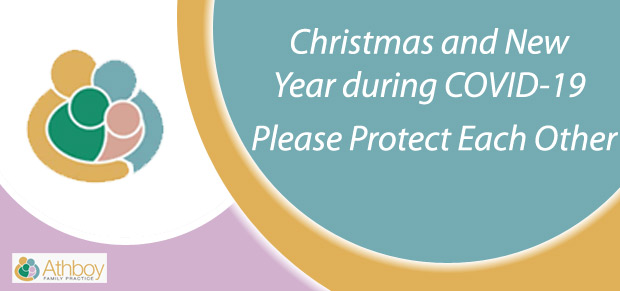
Christmas and New Year is an important time for us to meet with family and friends. Unfortunately, COVID-19 is still with us.
The social gatherings and events that are common at Christmas-time and over the New Year traditionally involve more close contact between people who do not meet on a day-to-day basis. This may bring with it a higher risk of transmission of COVID-19. There is usually more mixing of family members and friends and these relaxed gatherings are more likely to happen indoors, in less well ventilated spaces, and often involve eating and drinking in close proximity without wearing a face covering.
The European Centre for Disease Prevention and Control (ECDC) has considered the current situation regarding COVID-19 and the likely impact of the end-of-year festivities on the pandemic. ECDC has assessed that the risk of transmission of SARS-CoV-2 (the virus that causes COVID-19) to the general population is high over this coming period. For vulnerable individuals, including the elderly and people with underlying medical conditions, the risk is assessed as very high.
You can reduce the risk of COVID-19 over Christmas and the New Year:
- Reduce the number of social events you attend.
- Events with fewer people and of shorter duration are safer.
- Consider forming a social bubble with a small number of people (family or friends) who keep the same precautions, starting before the festive season. The more people you meet, the greater the risk of getting infected.
- Gatherings with only members of the same household pose the lowest risk of transmission.
- Arrange to meet friends outdoors rather than indoors where possible.
- Reduce the amount of time you spend indoors.
- If you do meet indoors, keep a window open for ventilation, subject to weather conditions and personal comfort.
- Consider restricting your movements before gatherings of family or friends, particularly if you will be meeting people who are at higher risk.
- Online gatherings with members outside the household or bubble are a safe alternative.
- Do not take part in any gatherings or travel if you have a positive test, are waiting for a test or the result, or have COVID-19 symptoms or have been a close contact of someone with COVID-19 in the past 14 days.
- Avoid unnecessary travel.
- Avoid sharing vehicles with people outside your household. If you do car share, wear a face covering and ensure every passenger wears one too. Keep windows open to ensure adequate ventilation.
- People who are more vulnerable due to age or ill-health might participate in religious ceremonies via radio or webcam where available.
- For residents of long term residential care facilities, including nursing homes, visits outside of their facility are not generally recommended at this time.
- If you are planning to visit somebody in a nursing home or other residential care setting, read the visiting guidance for healthcare facilities.
- Wash your hands properly and often with soap and water, or use alcohol hand sanitiser.
- Wear a cloth face covering or mask on public transport, in shops and other indoor settings, and in busy outdoor spaces where a lot of people gather. A visor does not give you the same protection as a face covering
- When you cough or sneeze, cover your mouth and nose with a tissue or your sleeve.
- Ensure social distance – keep a space of 2 metres (6.5 feet) between you and other people.
- Avoid crowded places as much as possible.
- At all times, be guided by the current government advice on the level of restrictions
- Further advice on protecting yourself from COVID-19 is available from HSE.
*Article Source: Health Protection Surveillance Centre website.

